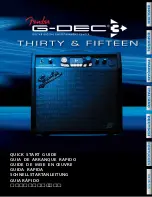
Control Summary
The
PROBE DEGAUSS AUTOBALANCE
indicator light will be orange if
the MANUAL BALANCE buttons have been pressed after a degauss has been
successfully completed. This indicates that the DC offset value has been manually
changed from the original value set during the degauss routine. Depending on
the amount of offset (balance) you have entered with the MANUAL BALANCE
buttons, another degauss operation may be necessary to ensure accurate
measurements. Generally, if you change the DC offset by more than 5 divisions,
you should de-energize the circuit under test and perform another degauss routine.
Then, reenergize the circuit and take your measurements.
If the degauss operation has failed, and the AC and DC COUPLING LEDs are
alternately
fl
ashing, this indicates the ampli
fi
er is displaying an error code with
the four status LEDs on the lower-left front panel.
Displaying Error Codes with the Probe Degauss Autobalance
NOTE.
The NOT TERMINATED INTO 50
Ω
LED is on when the ampli
fi
er
output is not properly terminated into a 50
Ω
load. Make sure your ampli
fi
er
OUTPUT is connected to an oscilloscope input using a 50
Ω
BNC cable, and
that the oscilloscope input is set to 50
Ω
impedance. Proper cabling is shown.
If your oscilloscope does not have 50
Ω
impedance settings for inputs, you can
place a 50
Ω
feed-through termination on the oscilloscope input and connect
the ampli
fi
er output cable to the termination. Do not place the feed-through
termination at the ampli
fi
er end of the BNC connecting cable.
MANUAL BALANCE
Buttons and Indicator
The MANUAL BALANCE buttons allow you to
fi
ne-adjust the DC offset that
appears at the ampli
fi
er OUTPUT connector. The manual balance adjustment
only functions when the ampli
fi
er is set to DC coupling, and the MANUAL
BALANCE indicator is only lighted after you press one of the MANUAL
BALANCE buttons in DC coupling mode.
PROBE OPEN Indicator
When lit, this indicator informs you that the current probe is unlocked. You must
have the probe slide locked to degauss the probe or to accurately measure current.
OVERLOAD Indicator
When this LED is red, it informs you that the measurement you are taking exceeds
the
continuous
current limit of the probe or ampli
fi
er.
When this LED is orange, it indicates that the safe operating temperature of the
probe, and possibly the ampli
fi
er, has been exceeded. Disconnect the probe from
the current source and allow time for the probe head and ampli
fi
er to cool.
TCPA300/400 Ampli
fi
ers and TCP300A/400 Series Current Probes User Manual
19
Summary of Contents for TCP300A
Page 2: ......
Page 6: ......
Page 18: ...Preface xii TCPA300 400 Amplifiers and TCP300A 400 Series Current Probes User Manual...
Page 34: ...Getting Started 16 TCPA300 400 Amplifiers and TCP300A 400 Series Current Probes User Manual...
Page 78: ...Specifications 60 TCPA300 400 Amplifiers and TCP300A 400 Series Current Probes User Manual...
















































